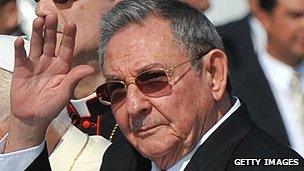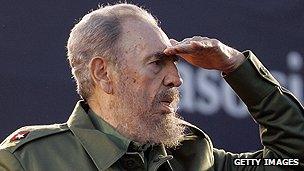Cuba profile - Leaders
- Published
President: Raul Castro

Raul Castro picked up the reins of power from his brother Fidel
Raul Castro, the world's longest-serving defence minister, took over as president in February 2008, succeeding his ailing brother Fidel, who had been in power for five decades.
Raul Castro became acting president 18 months earlier when his brother was incapacitated, and was formally named as president by the National Assembly days after Fidel announced his retirement.
After being re-elected by the single-party National Assembly in February 2013, Raul announced his intention to stand down at the end of his second term in 2018.
He had earlier called for a two-term limit and age caps for political offices, including the presidency, and eased out a number of his brother's elderly appointees in July 2013.
Fidel Castro brought revolution to Cuba in the 1950s and created the western hemisphere's first Communist state. His beard, long speeches, cigar, army fatigues and defiance of the United States earned him iconic status across the globe.
Raul, 76 at the time of this appointment, has been his brother's trusted right-hand man and was once known as an iron-fisted ideologue who executed Fidel Castro's orders - and enemies - ruthlessly.
Under his leadership, Cuba's Revolutionary Armed Forces became one of the most formidable fighting forces in the Third World with combat experience in Africa, where they defeated South Africa's army in Angola in 1987.

Fidel Castro outlasted no fewer than nine US presidents
A capable administrator, Raul Castro substantially cut the size of the army after the collapse of Soviet Communism threw Cuba into severe economic crisis. He introduced Western business practices to help make the armed forces self-sufficient. The military has a large stake in the most dynamic sectors of the Cuban economy, including tourism.
Raul Castro has also eased some restrictions on personal freedoms by lifting bans on mobile phones and home computers, and abolished the need of citizens to buy expensive exit visas when travelling abroad as tourists.
Following the election of US President Barack Obama, he said he was willing to respond to overtures from Washington and enter into dialogue with the US administration, but insisted that Cuba's Communist system remained non-negotiable.
In a surprise development in December 2014, President Castro and US President Barack Obama announced moves to normalise diplomatic relations between their two countries, severed for more than 50 years.
A first round of historic, high-level talks between the two sides took place in Havana in January 2015.
- Published25 February 2013